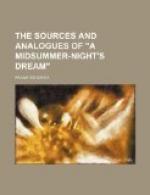Robin going by a wood heard two lovers make great lamentation, because they were hindered from enjoying each other by a cruel old lecher, who would not suffer this loving couple to marry. Robin, pitying them, went to them and said: “I have heard your complaints, and do pity you; be ruled by me, and I will see that you shall have both your hearts’ content, and that suddenly if you please.” After some amazement the maiden said, “Alas! sir, how can that be? My uncle, because I will not grant to his lust, is so straight over me, and so oppresseth me with work night and day, that I have not so much time as to drink or speak with this young man, whom I love above all men living.” “If your work be all that hindereth you,” said Robin, “I will see that done: ask me not how, nor make any doubt of the performance; I will do it. Go you with your love: for twenty-four hours I will free you. In that time marry or do what you will. If you refuse my proffered kindness never look to enjoy your wished-for happiness. I love true lovers, honest men, good fellows, good housewives, good meat, good drink, and all things that good is, but nothing that is ill; for my name is Robin Good-fellow, and that you shall see that I have power to perform what I have undertaken, see what I can do.” Presently he turned himself into a horse, and away he ran: at the sight of which they were both amazed, but better considering with themselves, they both determined to make good use of their time, and presently they went to an old friar, who presently married them. They paid him, and went their way. Where they supped and lay, I know not, but surely they liked their lodging well the next day.
Robin, when that he came near the old man’s house, turned himself into the shape of the young maid, and entered the house, where, after much chiding, he fell to the work that the maid had to do, which he did in half the time that another could do it in. The old man, seeing the speed he made, thought that she had some meeting that night (for he took Robin Good-fellow for his niece); therefore he gave him order for other work, that was too much for any one to do in one night; Robin did that in a trice, and played many mad pranks beside ere the day appeared.
In the morning he went to the two lovers to their bed-side, and bid God give them joy, and told them all things went well, and that ere night he would bring them ten pounds of her uncle’s to begin the world with. They both thanked him, which was all the requital that he looked for, and being therewith well contented he went his way laughing.
Home went he to the old man, who then was by, and marvelled how the work was done so soon. Robin, seeing that, said: “Sir, I pray marvel not, for a greater wonder than that this night hath happened to me.” “Good niece, what is that?” said the old man. “This, Sir; but I shame to speak it, yet I will: weary with work, I slept, and did dream that I consented to that which you have




